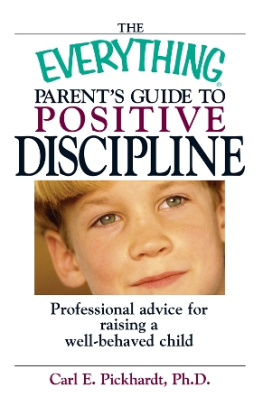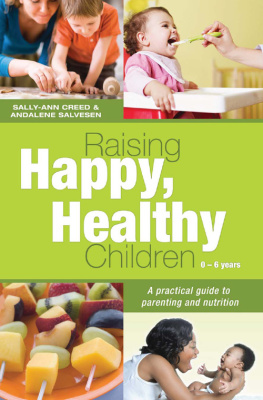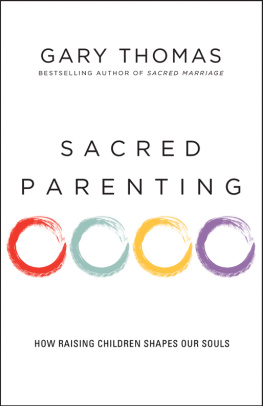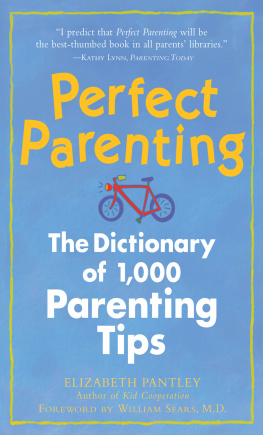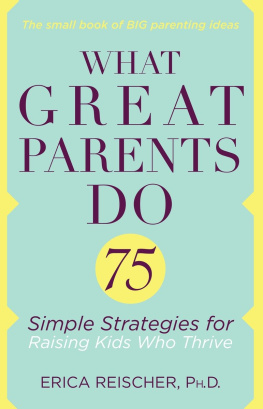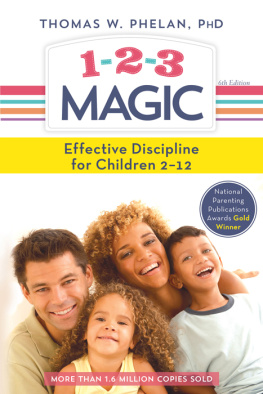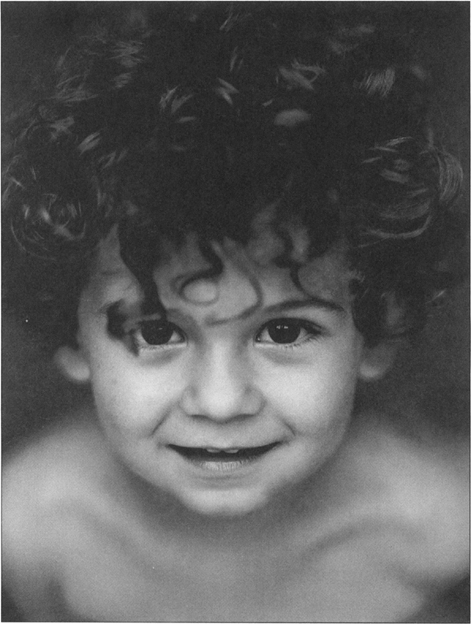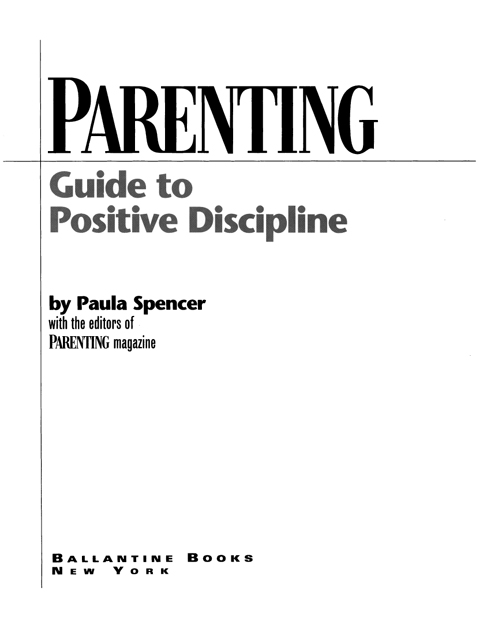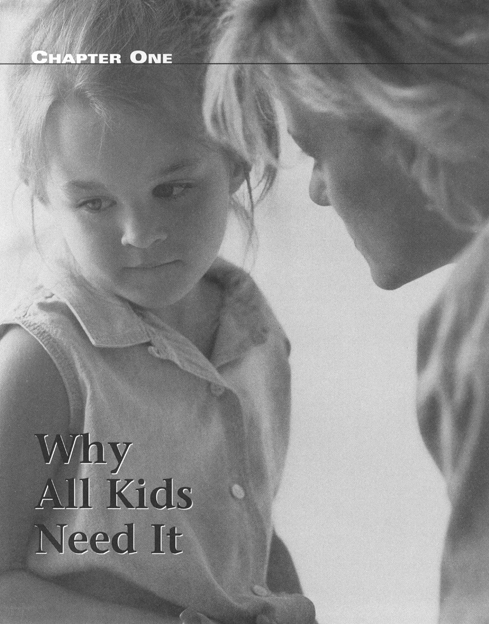A Ballantine Book
The Ballantine Publishing Group
Copyright 2001 by P ARENTING magazine
Illustration credits (by page number)
Brad Wilson/Photonica
Charles Thatcher/Tony Stone Images
Stephen Derr/The image Bank
Barnaby Hall/Tony Stone Images
Britt Erlanson/The Image Bank
Jerome Tisne/Tony Stone Images
Photonica
eBook ISBN: 978-0-345-54441-4
Hardcover ISBN: 978-0-345-41183-9
All rights reserved under International and Pan-American Copyright Conventions. Published in the United States by The Ballantine Publishing Group, a division of Random House, Inc., New York, and simultaneously in Canada by Random House of Canada Limited, Toronto.
Ballantine is a registered trademark and the Ballantine colophon is a trademark of Random House, Inc.
www.ballantinebooks.com
L IBRARY OF C ONGRESS C ATALOGING - IN -P UBLICATION D ATA
Spencer, Paula.
Parenting guide to positive discipline / by Paula Spencer with the editors of Parenting magazine.
p. cm.
ISBN 0-345-41183-8
1. Discipline of children. I. Parenting (San Francisco, Calif.) II. Title.
HQ770.4 .S64 2001
649.64dc21
2001025469
Text design by Michaelis/Carpelis Design Associates, Inc.
Cover photo Norbert Schfer/Corbis Stock Market
Manufactured in the United States of America
First Edition: August 2001
v3.1
For George
C ontents
C HAPTER 1
Why All Kids Need It
C HAPTER 2
Whats Your Discipline Style?
C HAPTER 3
Starting Out Right
C HAPTER 4
Its How You Say It
C HAPTER 5
Tactics That Work
C HAPTER 6
The Problem Solver
F oreword
O nce upon a time, before I was a mom, I was sure that when I had kids theyd be wonderfully behaved and cooperativewith their friends, each other, and, of course, Mom and Dad. As a parent, Id learn all the right things to say and do, so discipline would hardly be necessary.
Then I became a parent, and reality hit. My children, Jack and Laura, are wonderful. Theyve also been spirited, curious, and very age-appropriate. Which means that theyve required disciplineloving limits to give them the space theyve needed to flourish, feel confident, and get along well with others.
Are time-outs the most effective way to rein in a toddler? When do you try to negotiate, or give in? Whats too strict? There are plenty of theories about discipline. Your mom, friend, neighbor, and pediatrician may each have a different opinion and favorite method.
But theres no one discipline rule that fits all kids and their families. So whom should you trust? Yourself. You know your childs temperament, and your own, better than anyonewhether youre coaxing your preschooler to get ready for bed, or in the throes of yet another of a toddlers nos.
P ARENTING Guide to Positive Discipline offers reality-tested information and insights to help you fashion the discipline styles that work best for you, whatever the stage or situation. Its a resource we hope youll turn to for years.
Janet Chan,
Editor in Chief
P ATENTING
A cknowledgments
T hanks to the following people for helping to produce this book: at P ARENTING magazine, Bruce Raskin, Janet Chan, Lisa Bain, and Maura Rhodes. For reporting all of the family profiles, Id like to thank Heidi Kotansky. For photo research, Caren Alpert. For additional research, Valerie Fahey. This book could not have been written without the thoughtful advice of the many families and parenting experts Ive interviewed for P ARENTING magazine over the years, especially Dr. William Sears, Dr. Marianne Neifert, Burton White, Lynda Madison, Peter Williamson, and James Windell. Finally, special thanks to my family for giving me the time to write this (as well as very relevant firsthand knowledge!): George, Henry, Eleanor, Margaret, and Page.
The information and advice presented in this book have been reviewed for medical accuracy. They should not, however, substitute for the advice of your personal physician or other trained health-care professionals. You are advised to consult with health-care professionals with regard to all matters that may require medical attention or diagnosis and to check with a physician before administering or undertaking any course of treatment.
I ntroduction
F orget that Im the author of a book about disciplining young children. As a mother of four, Ill be the first to admit that this is one aspect of parenting that is truly easier in theory than in practice. Discipline is hard. Discipline is endless. Discipline is trickysomething both invisible and quite obvious. And not least, discipline can cause even a patient, confident, loving parent to feel impatient, unsure, and at times even mean.
But we keep at it because discipline is also one of the most important parts of child rearing. Or so I try to remind myself when my one-year-old is unspooling the toilet paper, my three-year-old is saying Poopy head! because I turned off the VCR, and the six- and eight-year-olds are feuding againall at the same time. My job as a parent isnt to keep them endlessly happy. (Much of what makes them happy, after all, involves making messes, breaking rules, and being unsociable.) Rather, my goal is to equip them to become pleasant, responsible individuals who know right from wrong and can exercise self-control.
All of that is easier said than done, of course. Youve got to think quickly and act coolly in the heat of the moment. There are a million different situations that can come up, and its impossible to handle every one of them flawlessly. Whats helpful, however, is having a good understanding of the real purposes of discipline (no, it doesnt mean spanking) and a repertoire of effective, practical strategies to choose from. This book summarizes both. As a parent, I feel theres nothing like the input of experienced expertsother parents and professionals aliketo bolster my instincts and arm me with useful tactics to try. Hopefully, these ideas will do the same for you. The goal: parents who feel better about discipline and, ultimately, children who are better behaved.
Paula Spencer
W hat happens when you think about the word discipline? Do you feel your muscles tighten at the memory of last nights power struggle with your preschooler? Let loose an involuntary, exhausted sigh? Worry that youre too soft or too tough? Do you aim to be just like your own parentsor exactly the opposite? Do you feel pretty good about the way you handle the day-to-day challenges, but wonder, in the back of your mind, how everythings going to turn out in ten or twenty years?
Whatever your mind-set, youve probably given the subject of discipline plenty of thought. Thats because it takes up a good deal of most parents time.
Whether your child is a baby, a toddler, a preschooler or a kindergartener, how you discipline helps shape his or her life.



